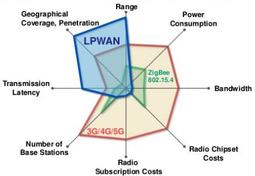Sigfox Interview Questions and Answers
Advertisement
This page provides top Sigfox interview questions and answers to help interviewees pass job interviews for Sigfox technology engineer positions. These Sigfox questions are written by specialists in the LPWAN domain.
Sigfox Interview Questions
Question -1: Which frequency band is used in the USA and Europe for Sigfox?
Answer -1: 868 MHz is used in Europe, whereas 915 MHz is used in the USA.
Question -2: What is the distance covered by Sigfox?
Answer -2: Sigfox supports distances of about 30 to 50 Km in rural areas and 3 to 10 Km in urban areas.
Question -3: Which modulation schemes are supported by Sigfox? Explain them.
Answer -3: BPSK and GFSK modulation schemes are used by Sigfox in the uplink (From End Points to Gateway) and downlink (From Gateway to End Points), respectively.
Question -4: Draw the Sigfox network architecture and explain the function of each Sigfox network element.
Answer -4: It uses an LTN (Low Throughput Network) architecture. It consists of end objects, a Sigfox gateway (or Base Station), the Sigfox cloud, and IT applications running on servers.

Question -5: What are the advantages and disadvantages of Sigfox technology?
Answer -5:
- Advantages:
- It handles small messages efficiently and is suitable for low data rate IoT/M2M applications.
- It offers increased battery life, increased network capacity, wide coverage, and lower cost.
- Disadvantages:
- CSMA/CA or any other such techniques are not employed in Sigfox.
- It cannot handle high data rate applications.
- It is not efficient to use in mobile environments due to interference and other issues.
Question -6: Describe the frame structure of Sigfox.
Answer -6: The following figure mentions the uplink MAC frame and downlink MAC frame used by Sigfox technology.

- Uplink MAC Frame =
{ Preamble (4 bytes), Frame synchronization (2 bytes) , End Point ID (4 bytes), Payload (0 to 12 bytes) , Authentication (var. length) , FCS (2 bytes, used as CRC) } - Downlink MAC Frame =
{ Preamble (32 bits or 4 bytes), Frame synchronization (13 bits), Flags (2 bits), FCS (8 bits), Authentication (16 bits), Error codes (variable), Payload (Variable) }
Question -7: Mention different Sigfox protocol stack layers and their functions.
Answer -7: Following are the protocol layers in a Sigfox stack:
- RF Layer: It handles frequency and power assignments of end points and BSs.
- PHY Layer: It takes care of preamble addition and removal. It takes care of modulation and demodulation.
- MAC Layer: It performs MAC frame management, FCS for error detection, and so on.
- Application Layer: Different applications are supported in this LTN technology.
Question -8: What is the size of the message supported by Sigfox technology?
Answer -8: For 12 bytes of data to be transported, the Sigfox frame uses 26 bytes in total.
Question -9: What is the difference between Sigfox and 5G?
Answer -9: The following table mentions the differences between Sigfox and 5G technologies.

Question -10: What is the difference between Sigfox and LoRaWAN?
Answer -10: The following table mentions the differences between LoRaWAN and Sigfox technologies.

This set of Sigfox interview questions and answers is useful for freshers and experienced job positions.
Advertisement
 RF
RF


